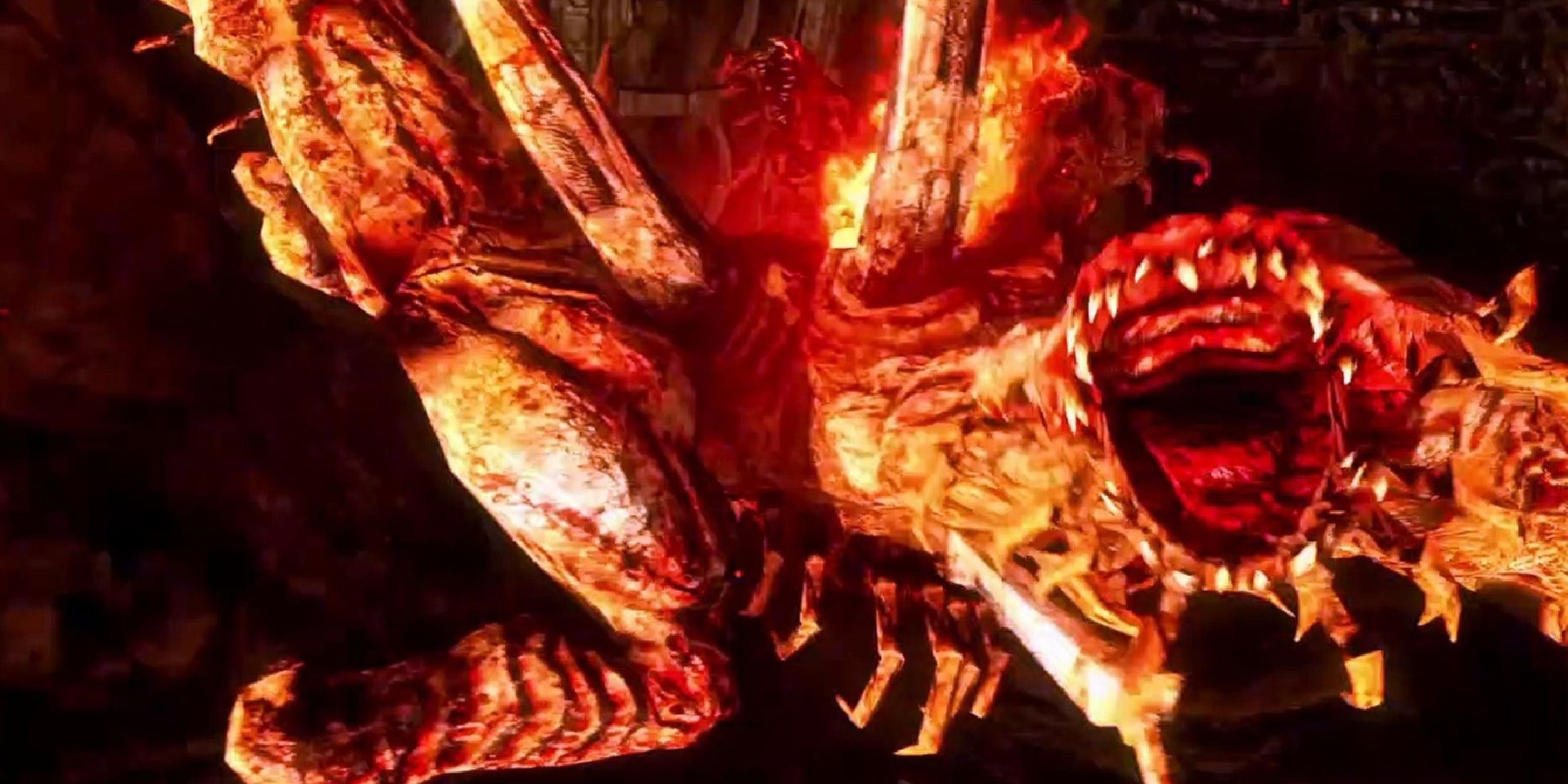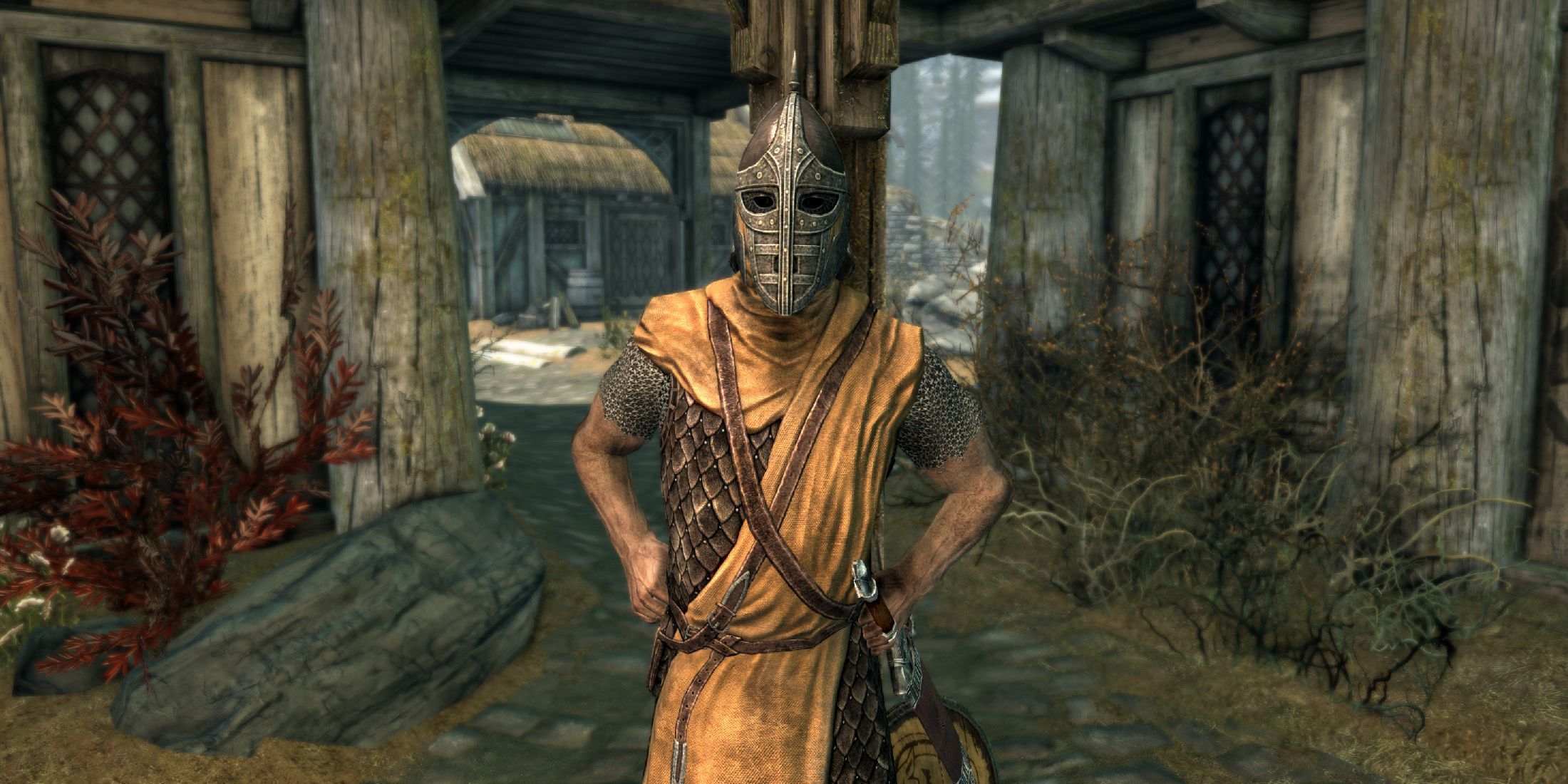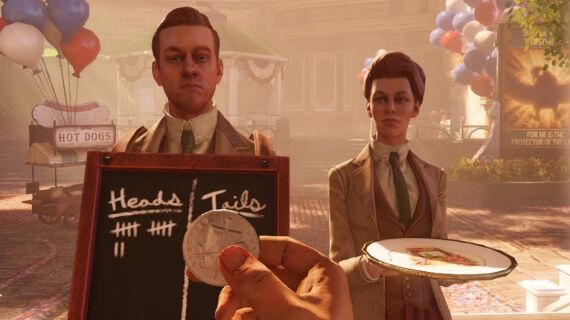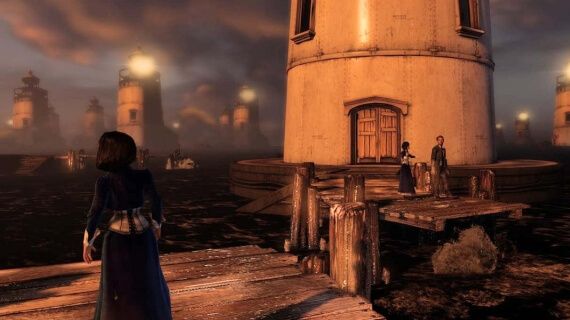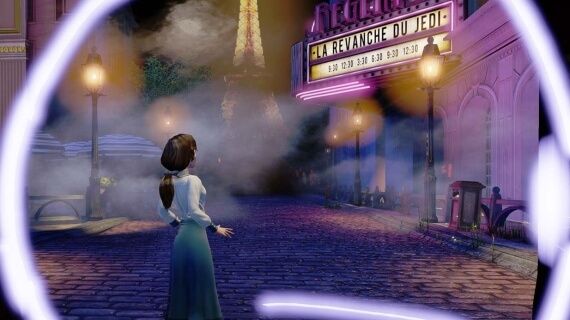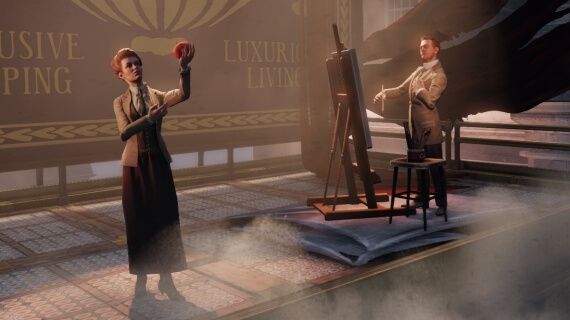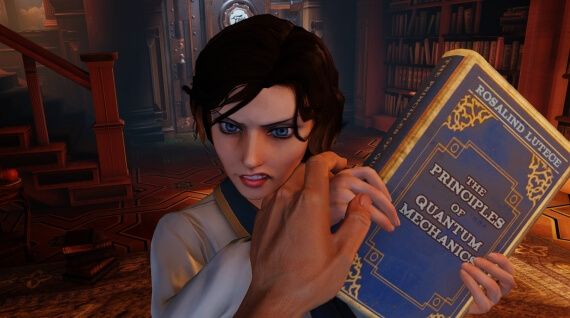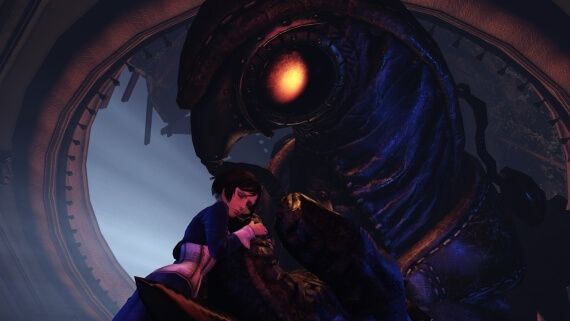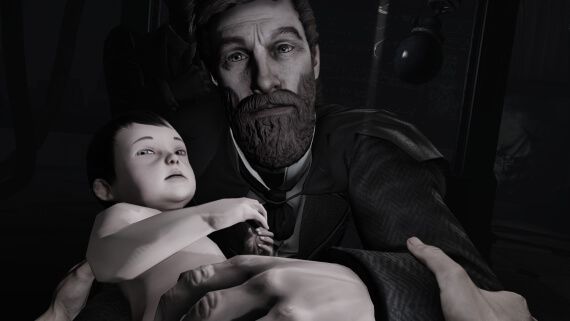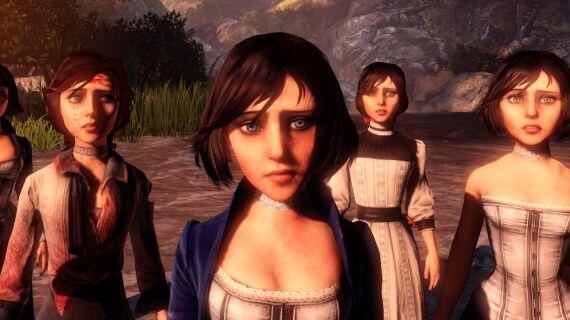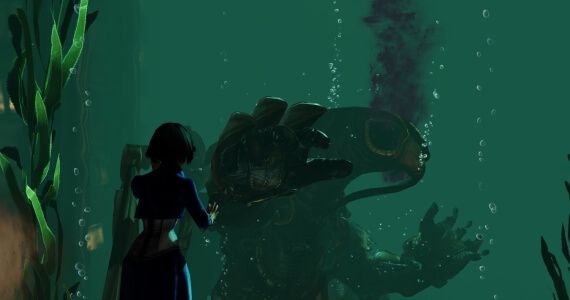Irrational Games made it clear with BioShock that toying with players' minds and perceived realities was their top priority; for BioShock: Infinite, they took that idea and ran even farther with it. But with ideas of fate, time travel, alternate realities and quantum entanglement all at work in between the gunfights and 'Vigors,' some clarification is likely needed.
BioShock: Infinite's ending moments will no doubt leave most players speechless (as predicted by Ken Levine months ago), but it shouldn't leave them confused. At least, not in a bad way. So to truly grasp the story that Ken Levine and his studio managed to tell from the game's opening scene, we thought we'd explain Infinite's ending more plainly. Needless to say, spoilers lie ahead.
The Quantum Conundrum
Quantum mechanics is a field of theoretical physics that even experts will claim is hard to understand or explain, but everyday analogies are numerous when discussing it for the layperson. For instance: you are walking down the street, and decide to cross from one side to the other; your day goes on normally thereafter. Scientists originally thought that your choice shaped your personal reality, and affected the universe as a whole in a minuscule way.
Quantum mechanics disagrees, with its developed theories claiming a single decision has vast ramifications. It was physicist Hugh Everett who first popularized the "many-worlds interpretations" of quantum physics, going one step further and explaining that every choice made also meant that a parallel universe was immediately formed in which the very opposite choice was made. The result of every past, present, and future decision of every single entity is an endless - or, one might say "infinite" - number of parallel worlds.
The reason that theories like these don't send the science community into anarchy is that the same beliefs which make the many-worlds interpretation possible also claim that it would never be possible for anyone to observe a universe other than their own. Not unless they were somehow able to look, listen, or even move through some sort of 'tear' between parallel realities.
Theoretical physics is a field usually restricted to the brilliant, and this explanation of just one facet of the study should illustrate why. But to anyone familiar with Everett's theory, the game's final scenes of Elizabeth explaining a vast star-scape as not stars, but "worlds" made perfect sense.
Next: The Role of Robert and Rosalind Lutece...
The Lutece 'Twins'
In the world of BioShock: Infinite, it is not a real-life physicist, but Rosalind Lutece who is credited with mastery of quantum physics. Aided by her 'brother' Robert, the two are seen from the game's outset as ushering Booker DeWitt to the lighthouse which acts as access to Columbia, categorizing the entire adventure as a 'thought experiment.' The exact experiment is what will happen if a person from one reality is allowed to engage with another, set in the future and also including himself as a participant.
While it isn't clear until the game's closing moments, most of the instances of Rosalind and Robert Lutece are commentary on the game's campaign and Booker's progress from a purely intellectual perspective. Whether it is their observation that Booker seemingly always flips a coin heads-side-up, or offering a choice of necklaces for Elizabeth out of curiosity, they are in on the game's plot twist from the beginning.
Although it is Rosalind who is quoted as saying that "[t]he mind of the subject will desperately struggle to create memories where none exist" in Infinite's opening scene, it is Robert who proves it. Robert is not Rosalind's brother, but an alternate version of her from a parallel reality; when Booker attempts to construct new memories to justify his presence in Columbia, Robert says he has gone through it himself. Again, confirming that he has joined Rosalind's reality from another, be it the one in which he acquires Booker's child for Comstock, or any other.
The pair are removed from time and space as a result of 'perishing' in their labs: the work of Comstock's sabotage upon discovering that they would eventually disagree with his goals.
Left to navigate parallel realities at their leisure, the pair found Booker DeWitt, the only man who could stop Comstock, and brought him into Rosalind's previous reality; where the game begins.
Next: The Singular Elizabeth - or Anna - Whichever You Prefer...
Elizabeth Comstock: Past, Present & Future
As the first of Infinite's main characters to leap from one reality into another, Elizabeth's abilities are actually quite well-explained given the quantum background of Columbia. Since Quantum physics are explained as the reasons Columbia's buildings are able to stay afloat - not lighter-than-air dirigibles, as earlier assumed - quantum phenomenon are common in the city. The barbershop quarter performance of The Beach Boys' "God Only Knows" is the most famous anachronism, but not the only one.
The seams between one reality and the next - known in the game as 'tears' - are observable to all, including Booker. The musician Albert Fink even attests to the profitability of listening in on other worlds, helping explain the likes of "Tainted Love" and "Everybody Wants To Rule The World" being played on gramophones throughout Columbia. But only Elizabeth is capable of interacting with them without the need for heavy machinery, due to the circumstances of her arrival.
Since Elizabeth is later shown to have left one of her fingers behind in another parallel reality, it's presumed that this grants her agency over the tears others can only observe. As she explains to Booker, the gift was limitless in her youth, allowing her to travel to nearly anywhere and any time. Only when Comstock constructed the Siphon to contain her, and the Songbird to protect her and prevent her leaving were her powers limited.
And even though the Songbird is relegated to a supporting role against hordes of Vox Populi and Columbia Police, he does his job without fail. His task is performed so admirably, in fact, that it is an aged Elizabeth who informs Booker that if left to fate's devices, the Songbird "always stops him." It is this older version of Elizabeth who has seen firsthand Booker's inability to save her, and has lived out her life in accordance with Comstock's prophecy - she sets New York City ablaze.
In a last effort to save the cycle from repeating as it has, is, and always will, the future Elizabeth creates a tear back through time, and instructs Booker to deliver a message. The message can only be understood by Elizabeth herself, and from that point on, the actions of Elizabeth and Booker seem to depart from other realities.
Elizabeth correctly deciphers the message, turns the Songbird into an ally, and uses it to destroy the Siphon. With her powers unleashed, she gains the ability to discover the infinite realities they exist within, and understands what has to be done to keep the cycle from repeating; knowledge that every version of herself who failed to defeat the Songbird never learned. With perspective comes clarity, and Elizabeth's sudden grasp of quantum theory leads both she and Booker to one point in his life that set their fates in motion.
Next: The Baptism as Branching Point...
The DeWitt/Comstock Baptism
Religious themes and examples of extremism are on full display throughout Infinite's campaign - even if they were, according to Levine, "tweaked" before release - but the pivotal scene(s) of the Christian baptism is actually significant beyond spiritual concerns. In short: Booker DeWitt's baptism following his role in the Wounded Knee Massacre (1890) is established - through Elizabeth's knowledge of all possible realities - as the decision which set the events of the game in motion.
From the perspective of the Booker DeWitt who acts as the game's hero, he attended the baptism, but refused to complete the sacrament. Instead choosing to live with the wounds of his military service (both physical and mental), DeWitt left the baptism ceremony and continued on working as a private investigator and fathered a daughter, Anna, with an unspecified woman.
But as Everett's many-worlds interpretation claims, for every reality which brought DeWitt to that stream and the rejection of the sacrament, one was also created where he chose to receive it. In those realities, DeWitt's baptism brought with it a new perspective, a new mission, and a new name: Zachary Hale Comstock. We as players are not privy to seeing firsthand the 'archangel' that told Comstock what he would create - was it truly a vision from God, or one of the future granted through Rosalind's machine? - but his efforts in founding the city of Columbia are documented in-game.
Unfortunately, the reborn Comstock built his floating city on the back of Rosalind Lutece's quantum experimentation. So while Comstock's vision promised that the prophet's seed would lead his people to cleanse the world of man's corruption - a possible future even glimpsed in the course of the game - his involvement in the experiments had left him sterile, unable to father a child. Comstock asked the obvious question: would a version of him that chose not to build Columbia suffer the same fate?
With Rosalind's help, Comstock was able to see that his, in his words, 'sinful self' that went on living elsewhere after his soul had been cleansed, had in fact fathered a daughter. It becomes clear that DeWitt was maneuvered to hand his child over to Comstock to pay off gambling debts, implying the older version of the man went to some efforts in manipulating DeWitt prior to purchasing Anna.
Realizing the price he has paid soon after handing off Anna, DeWitt attempts to take Anna back, and confronts Comstock as he attempts to return to his own reality alongside Rosalind and Robert. In the scuffle, Anna's pinky is severed (making her exist in two realities at one time, and granting her the ability to interact with tears) and DeWitt falls into a depression until meeting Rosalind and Robert some time later.
Meanwhile, Comstock realizes that the day may come when DeWitt pursues Anna with scientific help, and sets out to warn his people of 'the False Shepard Booker DeWitt,' and the mark he will bear on his hand: 'AD,' the initials of his daughter that DeWitt has branded himself with in shame. A brand that, thanks to his construction of false memories, he is unable to explain.
In the end, Elizabeth uncovers the truth of her abilities, and the infinite realities filled with endless variables, but always a few constants: Booker, herself, and a lighthouse. It is never made clear if the realities Elizabeth has access to are limited to those impacting her specifically, but one thing is clear: Comstock is present in all of them.
And so the pair must return to the baptism scene, and Elizabeth explains to Booker that if either he or Comstock walks away from the baptism, by default, both would. To truly erase Comstock (and his hateful acts, messages, kidnapping, Vox Populi rebellion and massacres, etc.) from existence, neither can be allowed to survive. Booker accepts the judgment in front of multiple versions of Elizabeth (proving that all roads do, in fact, lead back to the baptism), and allows them to drown both he and Comstock simultaneously.
Next: The Unanswered Questions...
The Unanswered Questions
"Will the circle be unbroken/ By and By, by and by/ There's a better home a-waiting/ In the sky, Lord, in the sky."
Although the central plot of Booker DeWitt's daughter, and the machinations of the man he could have been is wrapped up quite nicely, there are still questions left to nag the most invested players for months to come. First and foremost, if Elizabeth's theory holds true, and the player's final act in the game essentially makes the preceding hours of gameplay cease to exist.
The closing shot implies that Booker and Elizabeth are successful, as one by one, the parallel versions of her disappear from existence. Thankfully, the developers refrain from showing the most familiar incarnation of her wink away into nothingness, but logic says she does as well. We'll simply be grateful that Irrational leaves a bit of hope unsullied, even if her continuing to exist undercuts the sacrifice, and the entire adventure leading up to it.
But before the game's closing scene, there is one twist that likely is still a riddle to players, and certainly had BioShock fans leaping out of their seats.
The split-second decision to transport herself, Booker, and the Songbird to the underwater city of Rapture, the first game in the series' setting, is one of Elizabeth's ingenious strategies we still aren't certain about. While previous tears had shown only parallel version of Columbia, the trip to a different setting and time begs the question of how Elizabeth even knew about Rapture in the first place.
A previous quote of hers in the game, mentioned that when she was younger, she wasn't sure if the tears she opened were actual places, or ones brought into being as a form of wish fulfillment. Is Irrational explaining the story of BioShock as one such occurrence? And if Rapture is more than just a figment of Elizabeth's imagination, why do Andrew Ryan's genetic locks grant her access?
These questions aren't likely to be answered, but it does lead us to look even deeper into the post-credits scene, depicting Booker once again in his office, peering to see if his daughter Anna has been returned to him. The ambiguous nature of the cliffhanger means players can perceive the scene to be meaningless, a sign that Elizabeth was wrong and a version of Booker was able to survive with his daughter Anna, or perhaps the "better home a-waiting" Booker after death. Unless the developers explain it firsthand, we only have our theories to go on.
-
We invite everyone to add their own theories and speculation to the conversation, or even point out which moments of the game stand out the most to you personally.
BioShock: Infinite is available now for the PC, Xbox 360 and PS3.
---
Follow Andrew on Twitter @andrew_dyce.


